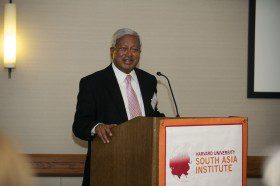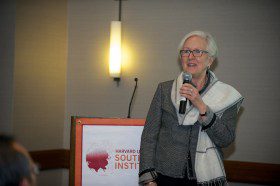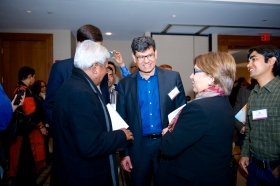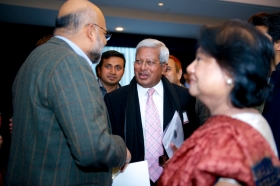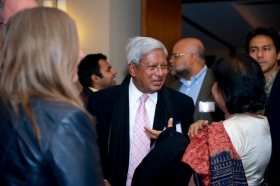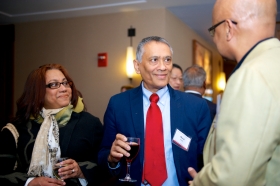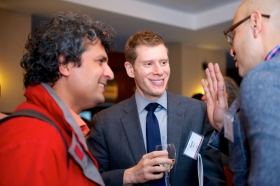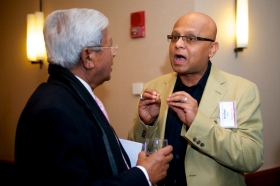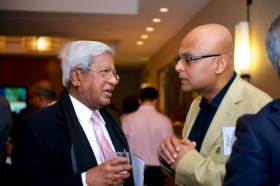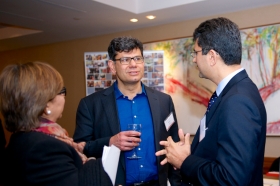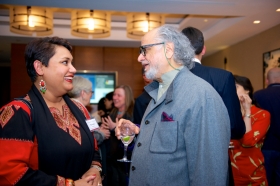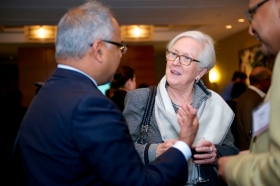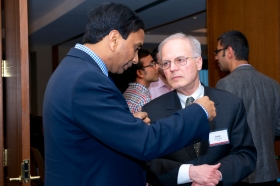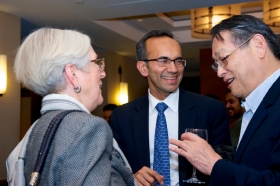“Hope is an element in which people take action, and energize themselves out of poverty,” said Sir Fazle Hasan Abed, Founder and Chairperson of BRAC, at the South Asia Institute Annual Harish C. Mahindra lecture on April 24, 2014 at the Charles Hotel. BRAC is the world’s largest NGO dedicated to development and fighting poverty, and Abed’s lecture provided the 150 attendees with an enlightening account of the extraordinary accomplishments of the global organization.
Abed was introduced by Martha Chen, Harvard Kennedy School, who explained that BRAC is the only NGO from a developing country that has “gone truly global,” with a presence in 12 countries in Asia and Africa. With a goal of alleviating poverty, BRAC delivers microfinance, health, education, agriculture and livestock services based on an integrated approach that proved to be a success story in Bangladesh.
Born and raised in Bangladesh, Abed was working as an accountant when the 1971 Liberation War broke out and deeply impacted his future. After advocating for his home country in London, he returned to Bangladesh after liberation, and launched relief and rehabilitation efforts for refugees. He founded BRAC with the goal of alleviating poverty by helping the poor develop capacity to manage their lives. This model has been successfully implemented in other developing countries around the world.
Chen explained that it was Abed’s corporate management background that was crucial to this strategy’s success; Abed’s ability to analyze and develop models that can then be then replicated on larger scales was essential in expanding BRAC’s work outside of Bangladesh. Moreover, Chen said Abed’s moral compass “keeps him focused on the poor and disadvantaged” and has been the driving force in BRAC’s growth over the last four decades.
Abed began his lecture by sharing statistics related to development in South Asia, highlighting that Bangladesh has experienced an extraordinary turnaround because of BRAC’s efforts. The numbers on life expectancy, infant mortality, fertility rate, under-five mortality, and child survival all show that Bangladesh has experienced the most dramatic change compared to other South Asian countries. 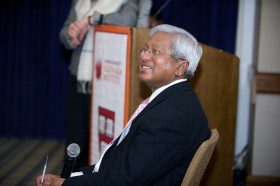
Poverty in Bangladesh was “intense” when BRAC started, and at the beginning Abed set out to work on many issues “at the same time, with the same sense of urgency”: health, drinking water, hygiene, sanitation, and family planning. He said that he is proud of the progress made in Bangladesh, but there is still work to be done.
Abed explained that maternal mortality and child health have always been vital issues, saying “a woman giving birth to a child and dying – there is not a greater tragedy than that.” BRAC University is working to train midwives, and Abed said he would like to have 10,000 midwives throughout the country to help reduce the death rate. Another initiative to help children was to go directly into the community and teach members how to create oral hydration therapy at home to prevent diarrhea. A campaign for immunization of the country’s children was also launched under his leadership.
Throughout his lecture, Abed’s experience in business and management was evident in his innovative approaches to these social problems, as well as his deep understanding of the needs of his people. BRAC has given out $1.5 billion in small loans, mostly for $100 to $150 per person, which he said has been helpful especially for empowering women. BRAC’s bank became the largest lender to small and medium enterprises after Abed found that BRAC was not doing enough for these types of businesses, where many jobs are created. 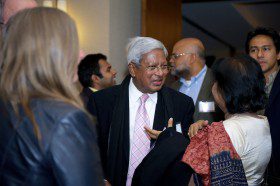 Turning to working with the ultra-poor, Abed realized that microfinance did not reach the poorest of the poor in Bangladesh. BRAC set up a program that gave them a stipend, “held their hand,” and nurtured them until they could get on their feet and then use microfinance. This model has helped 180,000 people get out of poverty.
Turning to working with the ultra-poor, Abed realized that microfinance did not reach the poorest of the poor in Bangladesh. BRAC set up a program that gave them a stipend, “held their hand,” and nurtured them until they could get on their feet and then use microfinance. This model has helped 180,000 people get out of poverty.
BRAC has also worked on education, especially for girls, which has helped empower mothers and reduce child marriage. Abed noted that this day was the 1 year anniversary of the Rana Plaza garment factory collapse. This tragedy prompted BRAC to work to implement new safety regulations to help improve the quality of life for factory workers, especially women.
Abed took time to answer questions from the audience, ranging from climate change, teacher retention, to genetically-modified seeds. On a question about the role of government, Abed explained that because government does not usually reach the village level, NGOs fill the role of working in villages. Abed sees development as a joint effort between businesses, the public sector government, and NGOs.
Read more about the Annual Mahindra Lecture.
– Meghan Smith

